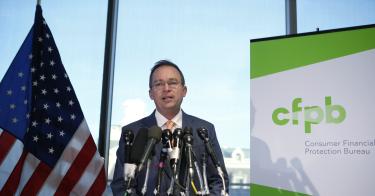Advocates of the Consumer Financial Protection Bureau (CFPB) give the impression that there would be no consumer protection without the CFPB. Yet Congress established a viable consumer-protection framework, layered on top of similar state laws, long before the 2010 Dodd-Frank Act created the CFPB. In fact, the bureau derived many of its powers from earlier laws.
Federal agencies had regularly prosecuted crimes that violated consumer financial protections for years. Dodd-Frank simply took authority from approximately 50 existing rules and orders stemming from almost 20 federal consumer-protection statutes and transferred it to the new bureau.
There was really no need to start up a brand-new bureaucracy, and the recent Wells Fargo case demonstrates how completely unnecessary the CFPB remains. The case against the bank had already been made by other regulators; the bureau was late to the party and simply piled on.
One could certainly argue that the pre-Dodd-Frank regulatory framework, which spread financial regulatory responsibilities among many different agencies, was suboptimal. But there is overlapping regulatory authority throughout U.S. financial markets, and it does not follow that creating yet another federal agency is the best solution. And if consolidation in one agency is the answer, why not transfer everything over to the Federal Trade Commission, the agency whose motto is “Protecting America’s consumers”?
Regardless, Dodd-Frank did not consolidate everything. The CFPB still shares consumer financial-protection functions with several federal regulators, including the FTC. But Dodd-Frank did more than merely transfer existing authority to the CFPB.
The pre-Dodd-Frank regime focused on protecting consumers from deceptive or unfair business practices. Congress went further by giving the CFPB authority to develop a new, ill-defined, consumer-protection concept: abusive practices.
This construct runs counter to the American system of limited government. The term is completely undefined in the U.S. Code. This policy allows the CFPB, an unelected arm of the federal government, to make up laws as it goes along.
The CFPB is not alone in this regard. It is yet one more example of a disturbing trend, that of Congress creating regulatory agencies that are unaccountable to the public in any meaningful way, yet empowered to essentially create laws by way of regulatory dictate.
To protect the American system of limited government, all such federal agencies should be eliminated. Independent agencies able to create and enforce laws erode the constitutional protections of U.S. citizens’ fundamental liberties. They also shield elected officials — the legislators who are supposed to be responsible for making laws — from accountability.
These problems are bad enough, but the CFPB runs counter to limited-government principles in other ways.
The bureau has independent litigation authority; a single director, removable only for cause; a budget completely immune to the regular appropriations process; broad judicial deference; and an exemption from Office of Management and Budget review of major rules.
No other federal regulator has that combination of characteristics, and no federal agency should.
The CFPB approach also directly contradicts the basic principle of the free-enterprise system; that transactions entered into voluntarily create benefits for all those involved. The CFPB simply is not designed to make rules for an economic system based on voluntary trade agreements. Rather, it is designed to make rules for a coercive, exploitative financial system.
The CFPB approach assumes that lenders regularly prey on helpless consumers, tricking them into accepting ruinous financial contracts that they cannot possibly repay. The idea that financial markets generally work in this manner defies logic. The overwhelming majority of financial firms successfully find customers who can pay them back because it is the only way to make customers happy and stay in business.
For free enterprise to work, government-imposed rules have to start from this point of view. As constructed, the CFPB poses a danger to Americans’ economic freedom.
This piece originally appeared in The Columbus Dispatch



